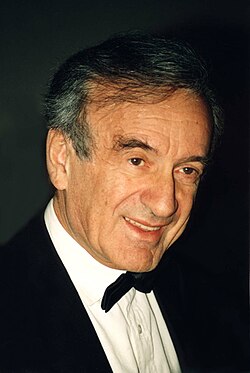Elie Wiesel Quote
Usually, very early in the morning. German laborers were going to work. They would stop and look at us without surprise. One day when we had come to a stop, a worker took a piece of bread out of his bag and threw it into a wagon. There was a stampede. Dozens of starving men fought desperately over a few crumbs. The worker watched the spectacle with great interest. Years later, I witnessed a similar spectacle in Aden. Our ship’s passengers amused themselves by throwing coins to the natives, who dove to retrieve them. An elegant Parisian lady took great pleasure in this game. When I noticed two children desperately fighting in the water, one trying to strangle the other, I implored the lady: Please, don’t throw any more coins! Why not? said she. I like to give charity…
Usually, very early in the morning. German laborers were going to work. They would stop and look at us without surprise. One day when we had come to a stop, a worker took a piece of bread out of his bag and threw it into a wagon. There was a stampede. Dozens of starving men fought desperately over a few crumbs. The worker watched the spectacle with great interest. Years later, I witnessed a similar spectacle in Aden. Our ship’s passengers amused themselves by throwing coins to the natives, who dove to retrieve them. An elegant Parisian lady took great pleasure in this game. When I noticed two children desperately fighting in the water, one trying to strangle the other, I implored the lady: Please, don’t throw any more coins! Why not? said she. I like to give charity…
Related Quotes
Certainly we can say that the pace of modern life, increased and supported by our technology in general and our personal electronics in particular, has resulted in a short attention span and an addict...
About Elie Wiesel
As a political activist, Wiesel became a regular speaker on the subject of the Holocaust and remained a strong defender of human rights during his lifetime, advocating for justice in numerous causes around the globe, including that of Soviet Jews and Ethiopian Jews, South African apartheid, the Rwandan genocide, the Bosnian genocide, the War in Darfur, the Kurdish independence movement, the Armenian genocide, Argentina's Desaparecidos, Nicaragua's Miskito people, the Sri Lankan Tamils, and the Cambodian genocide. He was also an outspoken advocate for Israel and frequently weighed in to support the country during escalations of the Arab–Israeli conflict and throughout the Iran–Israel proxy conflict, while also hosting direct talks to facilitate the Israeli–Palestinian peace process.
Wiesel was a professor of the humanities at Boston University, which created the Elie Wiesel Center for Jewish Studies in his honor. He received a number of awards, including the Nobel Peace Prize in 1986. He was a founding board member of the Human Rights Foundation and remained active in it throughout his life. Wiesel was one of the main figures who spearheaded the establishment of the United States Holocaust Memorial Museum in 1993.
